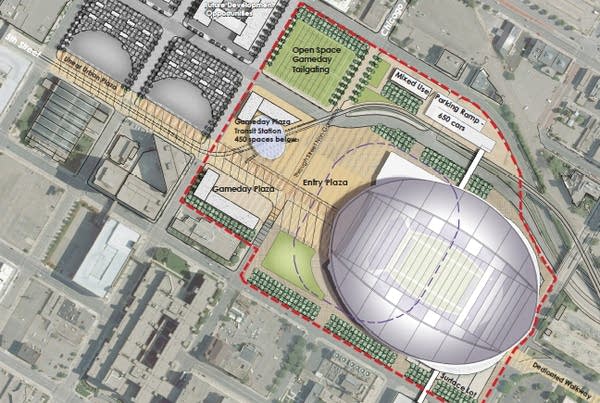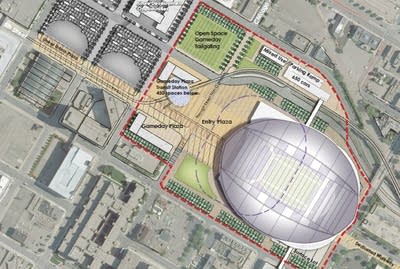As Vikings stadium bill is unveiled, even supporters raise questions
Go Deeper.
Create an account or log in to save stories.
Like this?
Thanks for liking this story! We have added it to a list of your favorite stories.

The debate over a Vikings stadium will finally begin in earnest next week at the State Capitol, as legislative supporters officially introduce a bill outlining the details of how it will be built and who will pay for it.
The text of the bill was released Friday, and for the most part it conforms to the plan that supporters announced last week.
The Vikings will pay $427 million for the new stadium at the Metrodome site in Minneapolis. The state will pay $398 million. The city of Minneapolis will pay $150 million by extending the life of an existing special sales tax.
The legislation appears to waive a Minneapolis requirement that any stadium financed with more than $10 million receive voter approval. But it also gives the Minneapolis City Council and Mayor R.T. Rybak the chance to veto the deal.
Turn Up Your Support
MPR News helps you turn down the noise and build shared understanding. Turn up your support for this public resource and keep trusted journalism accessible to all.
The measure also indicates that Gov. Dayton made a concession to try to get one key interest group on board.
Before the text of the bill was made public, Dayton announced he's putting more money on the table to try to get charities on board. The governor said he's willing to give charities that use pull-tabs to raise money $10 million in tax breaks, in exchange for them using both paper and electronic pull-tab machines.
Many charitable organizations had raised concerns about using the electronic pull-tabs, because they said they wouldn't make enough money by switching from the paper version of the game.
Revenue Commissioner Myron Frans said the additional money should ease the charities' concerns.
"A win for the charities to get tax relief and tax simplification, and to increase their profits for charitable purposes," said Frans. "It's also an opportunity to fund the Vikings stadium with this revenue stream of about $62.5 million per year."
Frans said the expected revenues from the electronic pull-tabs will still be enough to cover the bonds that will pay for the state's portion of the stadium.
The plan hit a snag when it was announced last week, because the charities said their costs were so high they were unlikely to switch to electronic pull-tabs. King Wilson, with Allied Charities of Minnesota, said the governor's offer might not change that.
"There certainly has been no agreement, and I'm not sure that the $10 million for the relief will be enough," he said.
The bill has other problems, too. Republican Senate Majority Leader Dave Senjem told reporters Friday morning that lawmakers are going to want a backup financing plan, in case the electronic pull-tabs don't produce enough money.
"If the committee process identifies that this is a problem, I think the bill goes on hold," said Senjem.
That backup plan isn't specified in the legislation. Senjem and DFL Senate Minority Leader Tom Bakk are listed as co-authors on the bill. But Bakk also declined to fully embrace the legislation.
"I can't commit to actually vote for the set of jackets that were introduced, but I would like to find some agreement as it goes through the committee process so it's something I can vote for," said Bakk.
Another obstacle could be Republican House Speaker Kurt Zellers, who has so far refused to say whether he supports or opposes the bill. Zellers said Friday that he won't lobby lawmakers to support it.
"The advocates are going to be the ones who get the 68 votes in the House -- 34 from the Democrats and 34 from the Republicans," said Zellers.
When asked whether he would consider himself an advocate, Zellers said no.
DFL House Minority Leader Paul Thissen said Zellers is going to have to show leadership for the Vikings bill to become law. Thissen, who also hasn't fully embraced the stadium plan, complained that Zellers is holding the bill to an impossibly high standard.
"The Republicans keep coming up with this idea that unlike every other bill that has gone through the Legislature in the last year and a half, bipartisanship means equal votes on both sides."
Gov. Dayton met privately with each legislative leader to discuss the stadium bill. He said he's still pressuring them to hold votes on it in the House and the Senate.




